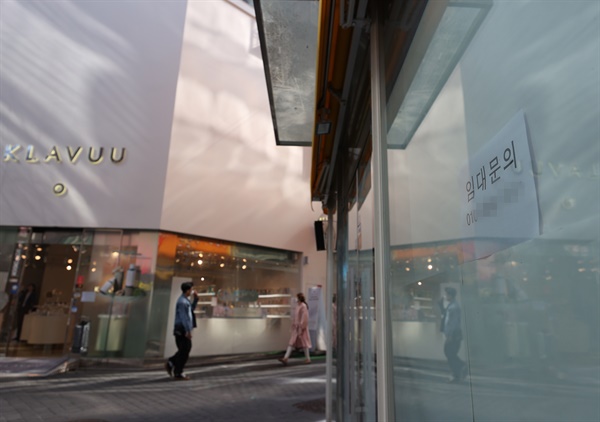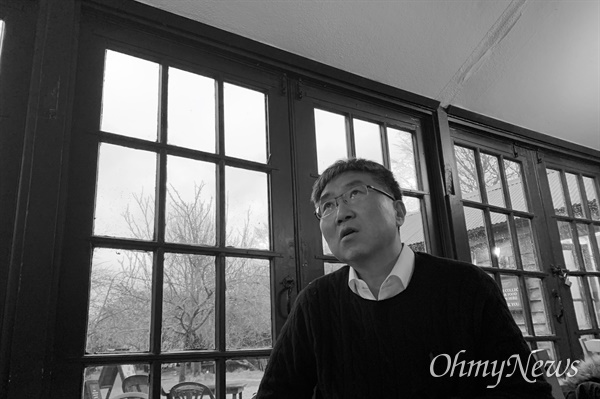▲지난 18일 영국 런던 지하철 내부의 한 모습. 영국정부의 '사회적 거리두기' 발표이후 런던 시내의 유동 인구가 크게 줄었다.
김종철
Drinking a cup of tea, Chang said, "So, I think the most important thing is to make a proper welfare state." "In fact, I've been talking about welfare for the past 15 years, even though it is not my major," he added with a smile.
It really was, as he said. The word "welfare" has rarely been left out in conversations with him since 2003, when I first met him.
I still remember what Professor Chang said: "the definition of welfare needs to be changed first". He thinks "welfare spending is not simply a burden or a cost, but rather reduces the burden." (article: "Free school meals are not for 'free', it is an insurance group-purchase" – 2012 interview)
"Creating a welfare state is not having a great revolution", he added. (article: "Is it a great revolution to enjoy some welfare?" Go to Africa if you don't want to pay taxes" – 2011 interview)
Chang has also talked about Park Geun-hye's welfare manifesto in the former presidential election, that "People who are shaking the welfare pledges of an elected president are traitors" (an interview in 2013). Park's government was elected with their manifesto of a welfare state and democratisation of the economy; however, those pledges were not achieved due to the massive political Choi Soon-sil scandal. He has also mentioned that the government of Moon Jae-In "needs to increase welfare more radically, to make citizens aware." (2019, interview)
Q: Although the governments in charge have changed several times, I have heard that they have been steadily increasing its welfare budget.
"There's still a long way to go. Our welfare spending is about 10% of our national income. It is lower than Chile, a South American country called the textbook of neoliberalism. The National Gini coefficient (a measure of distribution of income - the higher the number, the greater the degree of income inequality) is 0.34 before the government got tax revenues and spent on welfare, but the number (gini coefficient) is 0.33 even after welfare spending which is almost the same.
Most developed countries see their Gini coefficient drop significantly after government spending. This means that income redistribution has barely occured in our country."
Q: I see that the government's welfare spending is not very effective.
"The problem with this is that we have kept income inequality low only by regulating the market. Although the level of absolute income inequality has been low in the last decade, the rate of increase in inequality has been the highest in the world. The film that recently won shows this. The story of a family in the film mirrors the reality in our society. So the new society after COVID-19 will be very important...", said Chang.
Since COVID-19, a universal welfare state based on civil rights will be the only solution.
Q: You mentioned the post-coronavirus society a little while ago in the restaurant.
"The coronavirus epidemic will reveal what's hidden in our society. I do think South Korea was more mature politically than it has been in the past. Democratic measures including its effective controlling of COVID-19 in the quarantine process, transparency of information, and the provision of tests and treatment to all citizens, etc. can be rated as A. On the other hand, it is true that social and economic supporting measures are insufficient for temporary employees, small business owners, and short-term employees."
Q: What about the social safety net, overall inspection of the welfare system, etc.?
"I think ultimately, a universal welfare state based on civil rights will be the only solution. That's the fairest thing. If you only subsidise those who are defined as socially and economically vulnerable, then only those who met the standards will be protected, whereas those who are not allowed to be in the circle could be alienated or find it more difficult. We need to create a more humane society, a more collective and cooperative society, especially when there's a socioeconomic crisis caused by such viruses or disasters, as it (the welfare state model) would be able to overcome these better."
"It's a shame that South Korea seems to be following the US model," he said, citing an example of inefficient welfare spending in the United States.
"The US spends approximately 19 percent of its GDP on public welfare, which is lower than the OECD countries'average. However, it is 33 percent of GDP if you add individual spending on private insurance and medical service, which makes them the second highest welfare spending country in the world following Finland. It is not true that the US doesn't spend money on welfare, but the effectiveness is low due to low efficiency in spending. And South Korea is following the same path...", he continued.
"The difference is whether an individual person spends their own money on private insurance or saves money together through the government system to jointly purchase medical services.", Chang said. "In South Korea, people think welfare spending is a form in which the rich help the poor, but it is rather the form of a joint-purchase of social welfare services.", he added.
Q: The COVID-19 tests and free medical treatment provided by the South Korean government were possible because of national health insurance.
"We've created a system called the National Health Insurance system, which has enabled citizens to save their health insurance fees and hence joint-purchase the medical service at much lower costs. Most of all, we have offered tests and treatments to everyone. It doesn't matter whether you are rich or poor, everyone could get the virus. This could also be a long-term benefit for the rich as everyone needs to recover, reduce the risk of spreading the disease, and reduce the mortality rate etc."
What about basic income? Unless 100 million Korean won is given per person... Society will have to prioritize.

▲코로나19(신종 코로나바이러스 감염증)이 소비심리를 금융위기 때 수준으로 추락시켰다. 한국은행이 27일 발표한 '2020년 3월 소비자동향조사 결과'를 보면 이달 소비자심리지수(CCSI)는 한 달 전보다 18.5포인트 급락한 78.4를 나타냈다. 글로벌 금융위기 여파가 컸던 2009년 3월(72.8) 이후 가장 낮은 수준이다. 하락폭 역시 소비심리를 매달 조사하기 시작한 2008년 7월 이후 최대다. 사진은 27일 오후 서울 명동거리. 2020.3.27
연합뉴스
Q: In response to the crisis, local governments, including Gyeonggi Province, have decided to provide a certain amount of money by introducing 'disaster basic income'. (The government also recently announced that it will pay 1 million won for emergency disaster support based on four households.)
"Basic income varies and it can vary depending on how you use it. For instance, the godfathers of neo-liberalism Hayek and Friedman are supporters of basic income. They argue for giving money first, whether it's $10,000 or more, and individuals should use that money to take care of things like medical services on their own, with no any other welfare. I personally oppose this kind of basic income."
Q: I didn't think basic income had been that big issue in South Korea yet.
"It is pretty much the same reason why the American Silicon Valley's billionaires advocate basic income. It's definitely not a radical basic income at all. What they actually want to say is: "Yes, you're also humans, so you have the right to live without starving yourself, so I'll just give you some money, don't bother us anymore.", Chang continued.
"South Korea has yet to have a basic welfare system established, so if we rush to adopt it, it could actually become the 'basic income' that Hayek illustrates.", he said.
"I wonder how much it will improve the lives of young people considering the low-level of basic income, because it is not as if they are given 100 million Korean won each" he said. "What's more important is that basic income could be used to justify those arguments against welfare state expansion.", he added.
Chang cautiously said, "a society should sort out priorities to some extent, regarding basic income", and questioned: "will society be able to provide enough money for someone to live a satisfying human life?"
Q: South Korea will be holding a parliamentary election soon, what thoughts do you have on that?
"(Laughing) I'm not a political commentator..."
Q: I think this election will also be affected by the COVID-19.
"We demonstrated the power of democracy when we responded to the coronavirus. We've already achieved globally unprecedented economic development, and we've seen a lot of people come out on the streets to take actions and change the ruling party (government). We need to create a National Assembly that can maintain a mature democracy, which can give hope and vision to the people of South Korea."
Q: Could you give an example?
"Each party is announcing different manifestos, such as a 10-year plan for the welfare state. I hope they can present a big picture to the public, persuading and helping people to understand how they will lead the Republic of Korea based upon specific visions and practical plans."
He also said that we should learn a lesson from last year's general election in the UK. The individual manifesto made by the opposition Labour Party itself won the majority support of the people. However, they suffered their worst defeat ever, losing the votes of their traditional stronghold, the northern part of the UK. The Prime Minister Boris Johnson's Conservative Party responded to the Labour Party's policies only with the issue of leaving the European Union (Brexit).
Professor Chang said: The conservative ruling party's Brexit campaign and fake news dominated the election board, "Almost all newspapers and media, except for the Guardian, had a preference for the Conservative party". He thinks they found it hard to convince people and the reason behind it is because "the opposition Labour party sporadically announced too many policies".
The interview with him went well over three hours and it gradually grew dark outside. Professor Chang often used the word 'hope'. He highlighted that hope is the key to overcoming a global pandemicsand socio-economic crises of the likes that no one has experienced before.
We stood up and moved back to his hatch-back car. It was rush hour and the roads around Cambridge were crowded with cars. "Let's have tea again at Ochad Garden when the weather soon gets warmer.", he said. Will we be able to keep that promise? The lockdown in London is not yet finished.

▲장하준 영국 케임브리지대 교수(경제학)
김종철
Written by Jong-cheol Kim
Translated by Ha-eun Grace Choi.
* This report is the English version of OhmyNews Korean article. If you want to read the original article in Korean, click here!
저작권자(c) 오마이뉴스(시민기자), 무단 전재 및 재배포 금지
오탈자 신고
"대공황의 원인은 대중들이 경제를 너무 몰랐기 때문이다"(故 찰스 킨들버거 MIT경제학교수)
주로 경제 이야기를 다룹니다. 항상 배우고, 듣고, 생각하겠습니다.
공유하기
"I oppose this kind of basic income" Chang, a welfare state advocate, concerns
기사를 스크랩했습니다.
스크랩 페이지로 이동 하시겠습니까?
연도별 콘텐츠 보기